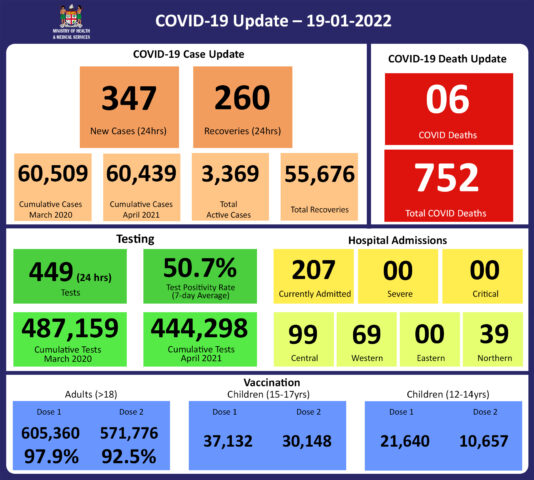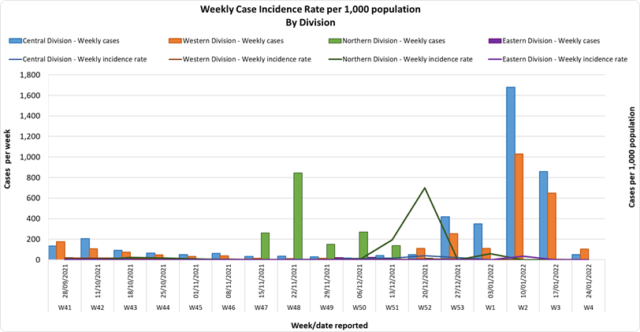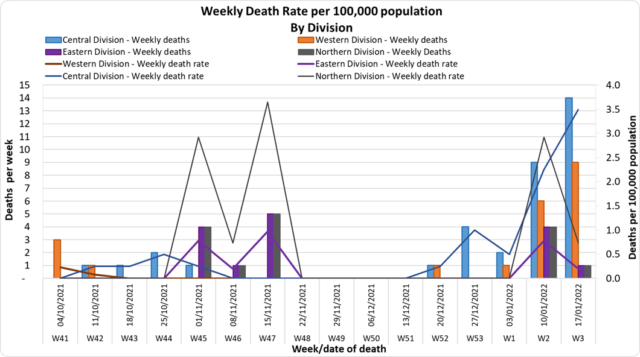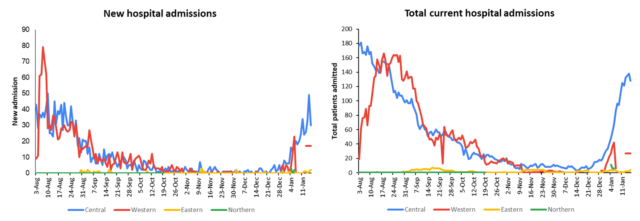COVID-19 Update 19-01-2022
COVID-19 Situation Update
Wednesday 19th January 2022
| Transmission Update:
In the past 7 days until 18/01/2022, 675 new cases were recorded in the Central division, 689 new cases in the Western division, 1 new case in the Eastern Division, and 142 new cases in the Northern Division. The Central Division cases constitute 68% of the cumulative total cases nationally, with the Western division making up 28%, 3% in the Northern Division, and 1% in the Eastern Division. Since the last update, we have recorded 659 new cases of which 312 new cases were recorded on 18/01/2022 and 347 new cases in the last 24 hours ending at 8 am this morning. Of the 659 cases recorded since the last update, 295 cases were recorded in the Central Division; 325 cases were recorded in the Western Division, 36 cases were recorded in the Northern Division, and 3 cases were recorded in the Eastern Division. The national 7-day rolling average of cases as of 15th January is 264 daily cases. |
| Deaths:
This curve depicts the weekly death rate per 100,000 population by division since October 2021. Overall, the death rate graphs indicate an increase in the number of COVID-19 deaths in, the Central, Western and Northern Division. There are six COVID-19 deaths to report. The first COVID-19 death to report is of a 64-year old male from the Western Division who died on arrival at the Lautoka Hospital on 12/01/2022. He had pre-existing medical conditions and was fully vaccinated. The second COVID-19 death to report is of an 89-year old male from the Western Division who died on arrival at the Sigatoka Hospital on 14/01/2022. He had a significant pre-existing medical condition and was not vaccinated. The third COVID-19 death to report is an 89-year old male from the Western Division who died at home on 15/01/2022 and was not vaccinated. The fourth COVID-19 death to report is of a 74 -year old male from the Central Division who died on arrival at CWM hospital on 16/01/2022. He had pre-existing medical conditions and was fully vaccinated. The fifth COVID-19 death to report is of a 75-year old male from the Central Division who died on arrival at the CWM hospital on 17/01/2022 and was fully vaccinated. The sixth COVID-19 death to report is of a 53-year old female from the Central Division who presented to the CWM hospital on 16/01/2022 in respiratory distress and was admitted. She had significant pre-existing medical conditions and died on 17/01/2022. She received one dose of the COVID-19 vaccine, which means she was not fully vaccinated. There have been 752 deaths due to COVID-19 in Fiji. Please note that due to the time required by clinical teams to investigate, classify and report deaths, a 4-day interval is given to calculate the 7 days rolling average of deaths, based on the date of death, to help ensure the data collected is complete before the average is reported. Therefore, as of January 14th, 2022, the national 7 days rolling average for COVID-19 deaths per day is 3.2, with a case fatality rate of 1.32%. We have recorded 710 COVID-19 positive patients who died from serious medical conditions they had before they contracted COVID-19; these are not classified as COVID-19 deaths. |
| Hospitalization:
There is an upward trend in daily hospitalisations. Using the WHO clinical severity classification, a greater percentage, 58% (n=119) of the admissions of COVID-19 positive patients are categorized as asymptomatic and mild, 31% (n=64) are categorized as moderate and 9% (n=19) as severe with 5 cases in the critical category. Anyone admitted to the hospital is tested before admission, therefore, a significant number of people are admitted to the hospital for non-covid health conditions, but incidentally, test positive due to the high amount of transmission in the community. The number of people being admitted because of COVID-19 remains low. |
Testing:
449 tests have been reported for January 18th, 2022. . The 7-day daily test average is 559 tests per day or 0.6 tests per 1,000 population.
The national 7-day average daily test positivity is 50.7%, which is above the WHO recommendation of 5%. The high positivity rate is an indication of widespread community transmission.
Public Advisory:
COVID-19 Deaths
Due to the protection afforded by the vaccination program, the reported deaths have been much less compared to the previous wave and the deaths have been mostly in individuals with high medical risk and who have died, either at home, on the way to the hospital, or within a few days of admission. These 2 factors (comorbidity and adverse health-seeking behavior) also make it difficult to narrate more precisely the extent to which COVID 19 contributes to the death of patients.
We have mentioned in the past that the vaccines are 80% protective against severe disease and death and not 100%. As such, if community transmission is high enough, rare outcomes will be more visible. Therefore in this current wave, our awareness of the symptoms of severe COVID-19 disease, and early presentation to a health facility when severe symptoms are present, are critical protection measures that we should know and act upon. The severe symptoms to look out for are: having trouble breathing (shortness of breath or difficulty breathing), ongoing chest pain, severe headache, confusion, inability to stay awake or wake up, pale, grey or blue-colored skin, lips or fingernails, worsening weakness, coughing blood.
Vaccine Plus Approach
Please remember that for the current wave we are facing, vaccination on its own is not enough for our protection. The Vaccine Plus approach means that we are keeping ourselves sufficiently protected by:
1) getting fully vaccinated (which includes getting a booster shot when due), plus
2) strictly adhering to the COVID transmission suppression protocols.
The COVID transmission suppression protocols are:
- Individual COVID safe measures (masking, physical distancing, avoiding crowds, hand hygiene), and
- Settings-based measures (social gathering restrictions, indoor capacity restrictions, ventilation, and curfews).
Following the Vaccine Plus Approach means that everyone has a role to play to protect themselves from the current outbreak, as well as future outbreaks from other new variants that can arise. The approach means that the Ministry and Govt will provide the opportunity for all eligible Fijians to access safe and effective vaccines that protect us from severe diseases and deaths due to COVID-19. It also means that we take responsibility for adhering to the COVID transmission suppression protocols on an individual basis, as well as on a collective basis in all community settings we engage in – whether it is at work, in school, at our local house of worship, or during a traditional ceremony. The Vaccine Plus Approach means we are collectively and equally responsible for our protection and our health – not just the Ministry of Health or the front-liners!
Vaccine Based Restrictions On Children Under 18 years
The Ministry reiterates the WHO endorsed position that children under 18 years should not be restricted from social interactions on the basis of vaccination status. Overall, there are proportionally fewer symptomatic infections, and cases with severe outcomes from COVID-19 in children and adolescents, compared with older age groups, and therefore such restrictions are not justified from a public health perspective. This is especially so that with the added requirement to adhere to COVID safe measures, the inherent lower risk in children and adolescents is further reduced. So while the Ministry is encouraging the vaccination of our children less than 18 years, it is still not compulsory and children are safe to interact in our communities while employing COVID safe measures at all times outside their households.
Healthcare workers and community-wide response
Health workers and frontliners have done their best for two years to protect as many of us as possible; we must now do our part to protect them, by getting vaccinated, and by taking precautions to prevent becoming infected, or infecting someone else. As we have seen all over the world, even if Omicron is less likely to cause severe disease or deaths compared to previous variants, higher levels of transmission mean more people getting infected in a shorter time period, which may still lead to a high number of hospitalizations and deaths. And when people are admitted with COVID, rather than for COVID, medical staff are still required to organize themselves to provide care for COVID and non-COVID patients. This means more hospital resources are needed and more staff are required to work, which puts further strain on an already stressed health system. COVID-19 is also not the only health challenge that health workers face every day. Taking the pressure off health systems will enable them to deal with the many other health challenges that our people face. Therefore, the COVID 19 response should now be a community-wide, whole-of-society program, where everyone plays their role.
As such while vaccination deployment will continue, our current efforts will be to support other Ministries and business entities to develop COVID safe protocols and to provide the appropriate oversight processes that ensure we all function in a COVID safe manner.
Together with the Ministry of Commerce, Trade, Tourism, and Transport we have put together a number COVID-Safe Protocols as approved by the respective Permanent Secretaries, and these are published online at https://www.mcttt.gov.fj/covid-19-business-protocols/, with effect from 17 January 2022—
- Protocol for COVID-Safe Business Operations;
- Protocol for COVID-Safe Retail Operations;
- Protocol for COVID-Safe Operations for Houses of Worship;
- Protocol for Enhanced Ventilation;
- Protocol for COVID-Safe Operations for Hairdressers and Salon Services;
- Protocol for COVID-Safe Operations for Tattoo Parlours;
- Protocol for COVID Safe Gym Operations;
- Protocol for COVID-Safe Cinema/Movie Theatre Operations;
- Protocol for COVID-Safe Operations of Bars and Taverns;
- Protocol for COVID-Safe Gaming Venue Operations;
- Protocol for COVID-Safe Tourism Accommodation Operations;
- Protocol for Land Transport Services;
- Protocol for COVID-Safe Operations for Outdoor Events;
- Protocol for COVID-Safe Operations for Independent Event Halls and Hire Venues.
The COVID-19 Incident Management Unit had been rolling out community engagement training with community health workers, turaga-ni-koro, mata-ni-tikina, church leaders, school managers, headteachers, and principals in rural areas throughout Fiji. The outcome of this training is COVID-19 preparedness equipping local communities with the knowledge to carry out community-based surveillance, care pathways for COVID-19 cases, and COVID-19 safe measures.
Preparing for adverse weather events
We are still in the cyclone season and the public is reminded to prepare well for their health needs that can arise during an adverse weather event. Those who take medications regularly for chronic illnesses should ensure that they have an adequate supply of medications with them. All medicines kept at home must be kept in waterproof containers and in dry places away from children and safe from the elements. Families should ensure that the health needs of the vulnerable members of the family such as pregnant mothers, babies and children, the elderly, and the disabled are considered carefully, and plans in place for their safe and immediate evacuation to a health facility if the need arises during a climatic event.
Weather disturbances can cause the increase of climate-sensitive diseases such as leptospirosis, typhoid fever, dengue fever, and diarrhoeal diseases. The public is advised to take actions to protect themselves from these diseases and to prevent the spread of the diseases in our community.
Drinking water should be boiled if the color of the water turns turbid or the regular water supply is frequently interrupted. Stored water should be covered to protect against dirt and pests. Compounds and the home surroundings should be cleared of loose materials and debris that can injure individuals and attract pests. Household rubbish should be disposed of properly, and proper personal protective equipment should be used when outside the household. Children should also be advised on the health risks associated with bathing in flooded water around the home, and in flooded drains, creeks, and rivers, and be discouraged from doing so.
Volcanic eruptions in Tonga
The Ministry encourages members of the public to pay close attention to the advice of the NDMO and the Department of Environment on the environmental risks associated with volcanic eruptions in Tonga. We are working closely with the relevant government agencies on the proposed environmental and health assessments to be conducted for our island communities in the Lau group. Our environmental health team will also conduct random water sampling to assess the impact of the ash cloud on rainwater and our water sources. Meanwhile, members of the public affected by these events are advised to report any health manifestation immediately to your local health facility for assessment and care.
Last Updated on 3 years by Publishing Team




